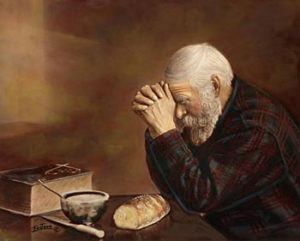Two images from my childhood are seared into my mind. One is this painting-like photograph that hung over our dining room table for as long as I can remember. Little did I know then that the picture is ubiquitous, hanging in homes, churches, and even offices throughout the world. (Read its story here.)
The other image is similar, but even more life-like: it is my father, seen through the cracked-open door in his study at home, sitting at his large oak desk, bowed in prayer; or in the easy chair in the same room, Bible open on his lap; or kneeling in prayer at that chair, hands clasped under his head like the old man in the photograph.
Anyone who has grown up around church has some concept of prayer. Most Americans, in fact, undoubtedly have some concept, even if it comes more from stereotypes and Hollywood caricatures than from the devout practices of faith. Actually praying, however, is a different matter.
“Praying is simply talking with God.” Or is it? There is truth in the statement, but it is woefully inadequate and short-sighted: it reduces prayer to task and information; it shifts the focus and the power of prayer away from the relationship that God wants to have with us and puts the focus on us, on me, on the one “doing the praying.”
The earnest (heartfelt, continued) prayer of a righteous man makes tremendous power available [dynamic in its working]. (James 5:16b, Amplified Bible, 1987)
But how do we pray? We begin with a heart that desires a relationship with God. Adam and Eve used to walk with God in the evening, but when they sinned, they hid…until God said, “where are you?” Those first words of grace in the Bible invited them back into the relationship that had been broken by their disobedience. And they are the words God speaks to invite us into a prayer relationship with him.
There is a place for words in prayer. There is even a place for asking—for healing (Mark 10:51), for life (2 Kings 20:1-11), even for success and prosperity (1 Chronicles 4:10). But the asking flows out of relationship. When King Hezekiah prayed for his life to be spared, he prayed, “I have walked before you in faithfulness and with a whole heart” (2 Kings 20:3, emphasis mine).
The hard work of prayer begins with relationship, focuses on relationship, and builds relationship.
Prayer, as Jesus taught his disciples, begins with recognizing the One in whose presence we stand (“Our Father in heaven”) and his character (“may your name always be kept holy”). In prayer we submit ourselves to his will (“your kingdom come, your will be done”); that’s the really hard part, because those words rarely line up with our heart.
And only when our eyes and mind and heart are truly aligned with God’s are we set free to say, “give us this day….”
There is no magic formula for prayer, but Jesus’ disciples asked him to teach them how to pray, this was his response:
Our Father—Daddy, Papa—in heaven, you are holy; let us keep your name holy. You reign in heaven; reign here on earth, too, even now. Do what you want to do, what is best; I willingly submit to your will. Give us today [no sooner, no later] what we need for today [no more, no less]. Forgive us our debts, our sins, our disobedience; even as we forgive those who owe us, have wronged us, have hurt us. Don’t lead us into temptation [Jesus already went there for us], but deliver us from evil and the evil one. Amen. [Which simply means, “I agree”—it isn’t just a period at the end of a sentence, it is a word of submission to God’s will. Use it well!]


 When You speak, when You move
When You speak, when You move
